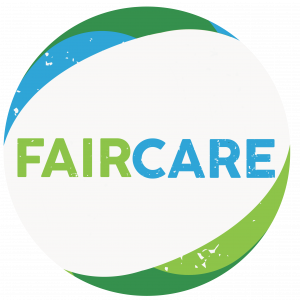Project title:
Fair Care
Learning and Training for Inclusion and Self-determination in Long Term Care 
Project duration:
01.10.2024.- 31.05.2027.
Partner organisations:
Verein zur sozialen und beruflichen Integration e.V. – GERMANY
Cooperativa Sociale Cooss Marche Onlus Societa Cooperativa Per Azioni – ITALY
Ske Pelendriou – CYPRUS
People First Közhasznú Egyesület – HUNGARY
Social Enterprise International Tuatha Ltd – IRELAND
3IN Social, SCCL – SPAIN
Project summary:
The innovation of the FairCare project is the involvement of all groups participating in the development of independent living. People in need of care, family members and carers, as well as institutional staff are thinking together.
FairCare will develop a holistic and comprehensive training program in close collaboration with the target groups, implemented in local FairCare Training Centres to empower people with disabilities and/or in need of care to exercise self-determination in long term care. This will support them in effectively communicating their own needs and desires to their informal (e.g., relatives and partners) and formal carers (e.g., professional nurses) and, thereby, exercising greater self-determination in their daily lives.
An Advisory Team of the three target groups will be set up in each country to advise and shape the project’s work before decisions are taken.
Three types of trainings will be developed:
1. peer training for disabled / elderly people to become peer counsellors,
2. cooperation training for the collaborative work of the three target groups,
3. community training on the provision of long term care.
Project outputs:
A FairCare Methodology will give an overview over the theoretical background.
The FairCare Curriculum and Course will be supported by the FairCare Toolbox containing, video tutorials and the online FairCare collaboration tool.
The trainings will be facilitated in partner countries locally established FairCare Training Centres.
The FairCare Handbook will provide hands-on guidance for practitioners in social and care services on how to adapt FairCare. The FairCare Memorandum supports this with a mission statement.
Target groups:
1. The primary target group are elderly and people with disabilities in need of care who want to live a self-determined life in their chosen living environment with adequate support services provided.
The group of elderly people and people with disabilities is very heterogeneous. Yet, many people acquire their impairments due to age. Hence, elderly people might not view themselves as disabled but in fact share similar experience such as not being viewed as being able to live autonomousand self-determined whilst receiving high-levels of support.
2. The secondary target group are relatives, friends and other informal carers who provide them with the necessary care and support services, which the professional care system does not provide or cannot provide sufficiently in the desired form and quality. As those affected, they too have individual needs and challenges that inform the desired and necessary approach to support. However, informal carers are most often neither sufficiently equipped with the training and skills to carry out their tasks nor viewed as knowledgeable and experienced resources in the organisation and provision of care.
3. The tertiary target group are formal carers who want to work in a support and care system in which they contribute their professional skills in such a way that people in need of care live as self-determinedly, safely and independently as possible and can participate in social life.
The aim is for all three target groups to interact in a closely cooperative way.
In addition to the organisations of the project partners, other target groups include self-advocacy and self-representation associations of relatives and people in need of care and support, professional associations, municipal decision-makers and social service providers.
The main task of People First Association as a Hungarian partner in the project is:
As in all international projects, our main task is to advocate the principle of “Nothing about us without us!”, i.e. to involve people with disabilities in every level, as they are the best experts in their field.
People First is responsible for the full accessibility of the FairCare project. In the training material, we will develop a chapter on “Self-determination and self-empowerment of people in need of care”. We will develop a FairCare digital collaboration tool. Our association will be responsible for developing a Exploitation Plan and a Communication Strategy, as well as for coordinating activities on social media and the website.
Funded by the European Union. Views and opinions expressed are however those of the author(s) only and do not necessarily reflect those of the European Union or the European Education and Culture Executive Agency (EACEA). Neither the European Union nor EACEA can be held responsible for them.

